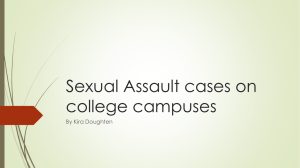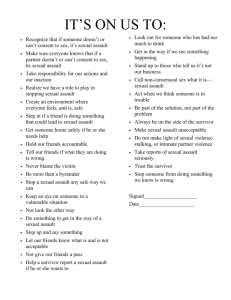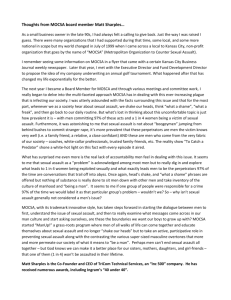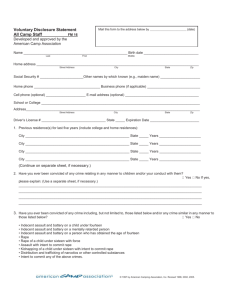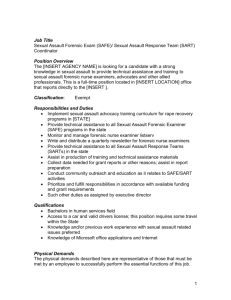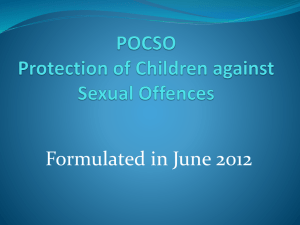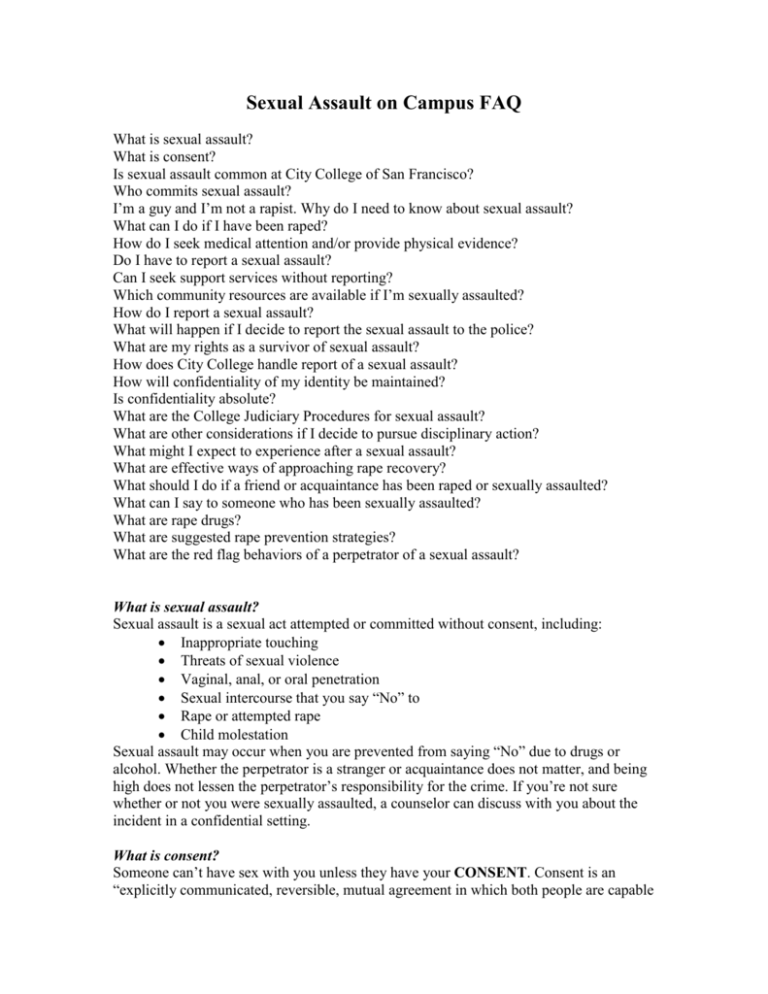
Sexual Assault on Campus FAQ
What is sexual assault?
What is consent?
Is sexual assault common at City College of San Francisco?
Who commits sexual assault?
I’m a guy and I’m not a rapist. Why do I need to know about sexual assault?
What can I do if I have been raped?
How do I seek medical attention and/or provide physical evidence?
Do I have to report a sexual assault?
Can I seek support services without reporting?
Which community resources are available if I’m sexually assaulted?
How do I report a sexual assault?
What will happen if I decide to report the sexual assault to the police?
What are my rights as a survivor of sexual assault?
How does City College handle report of a sexual assault?
How will confidentiality of my identity be maintained?
Is confidentiality absolute?
What are the College Judiciary Procedures for sexual assault?
What are other considerations if I decide to pursue disciplinary action?
What might I expect to experience after a sexual assault?
What are effective ways of approaching rape recovery?
What should I do if a friend or acquaintance has been raped or sexually assaulted?
What can I say to someone who has been sexually assaulted?
What are rape drugs?
What are suggested rape prevention strategies?
What are the red flag behaviors of a perpetrator of a sexual assault?
What is sexual assault?
Sexual assault is a sexual act attempted or committed without consent, including:
Inappropriate touching
Threats of sexual violence
Vaginal, anal, or oral penetration
Sexual intercourse that you say “No” to
Rape or attempted rape
Child molestation
Sexual assault may occur when you are prevented from saying “No” due to drugs or
alcohol. Whether the perpetrator is a stranger or acquaintance does not matter, and being
high does not lessen the perpetrator’s responsibility for the crime. If you’re not sure
whether or not you were sexually assaulted, a counselor can discuss with you about the
incident in a confidential setting.
What is consent?
Someone can’t have sex with you unless they have your CONSENT. Consent is an
“explicitly communicated, reversible, mutual agreement in which both people are capable
of making a decision.” Silence is not consent. “No” is not consent. Having sex with
someone who reasonably believes that there is a threat of force is rape.
Is sexual assault common at City College of San Francisco?
Sexual assaults occur infrequently at City College of San Francisco, but everyone should
be alert to their existence. In California, 9,598 forcible rapes were reported in 2004.1
Only 28% of all sexual assaults, however, are ever reported to law enforcement.2 18% of
all women have been raped at some time in their lives.3
Who commits sexual assault?
While anyone can be a rapist, most sexual assaults involve a man acting against a
woman’s wishes. People who commit sexual assault are usually acquainted with their
victims. Drugs or alcohol is often involved.
I’m a guy and I’m not a rapist. Why do I need to know about sexual assault?
Men are raped as well. Sexual assault affects us all. While the statistics for women are
more significant than those for men, sexual assault is not strictly a women’s issue.
Assuming you have women in your life – mother, sister, daughter, wife, friend, or
grandmother – knowledge about sexual assault helps to make sure that it does not happen
to a loved one, or that you do not unknowingly contribute to an atmosphere or situation in
which the crime may occur (e.g. you are a member of a fraternity where people are given
substances in parties). It is important that you recognize how sexual assault affects a
person, and what you can do to help in his or her recovery process.
What can I do if I have been raped?
1. Go to a safe place. This is not the time to be alone. At the very least, you need
emotional support. If you’re on the Ocean campus during operating hours, you can go to
the Student Health Center (on the corner of Phelan and Judson), the office of the Dean
and Student Affairs (Conlan 106), the SFCCD Police Department (Cloud 119) 4, or any
counseling or administrator’s office.
2. If there’s no one to go to, call someone, no matter how late it is. If you’re on campus:
pick up a yellow emergency phone
press #1 at any campus pay phone
push the “CCSF Police” button at any CCSF desk telephone
or call (415) 239-3200 with your cell phone
Attorney General’s Crime in California Report, 2004
Bureau Justice Statistics
3 U.S. Department of Justice
4 CCSF Campus Police is obligated to write a formal police report when you say that you have
been raped. However, if you clearly state to the Police that you wish to get medical services from
the San Francisco Trauma Recovery and Rape Treatment Center or Student Health Services, you
will have more discretion as to when you want to file a formal report. Campus Police is available
24 hours a day and can assist you with getting to a treatment center, referring you to appropriate
resources, and/or providing you with critical information, without making a formal report.
1
2
3. Get medical attention. As soon as possible, go to a hospital or the Student Health
Center. You need to be examined and treated for injuries. Treatment for HIV prevention
must begin within 72 hour, but the sooner the better. You may want to take steps to
prevent pregnancy as soon as possible. At the very least, you need to get tested and
maybe treated for various sexually transmitted infections
4. Report to the police. Evidence collected soon after the assault will be valuable if you
decide to report (even if you don’t report, you can still provide medical evidence to a
hospital). If you haven’t already, don’t shower or clean yourself first. If you change,
place your clothes in a paper bag. Going to the police doesn’t commit you to filing
charges. Getting assistance from the police does make filing charges easier at a later date
though. When you contact the police, you can take someone with you. You can go the
next day, but the sooner the better.
5. Consider whether or not you want to file charges. The process of filing charges can be
a long and difficult one. You must decide for yourself based on your own circumstances.
Before you decide, you can speak with the police about what will happen. If you need
more support, organizations such as the Bay Area Women against Rape (BAWAR) are
available to help you consider the pros and cons.
How do I seek medical attention and/or provide physical evidence?
Confidential and sensitive care, examination, and treatment are available 24 hours a day
at San Francisco Rape Treatment Center at San Francisco General Hospital, the
designated evidence collection site for sexual assaults that occur in San Francisco. An
important part of the criminal investigation is the collection of physical evidence. A
survivor should go to the hospital as soon as possible after the incident (without
showering, or changing, although she (he) should bring a change of clothes, if possible).
Although the Student Health Center is not an evidence collection site, the center will
make arrangements for you to go to San Francisco General Hospital, where the Sexual
Assault Nurse Examiners (SANE) will collect and preserve specimens as evidence for
court proceeding should you want to press charges in the future.
Do I have to report a sexual assault?
You have the right to decide. Only one out of ten people ever reports her (his) sexual
assault. Survivors may feel ashamed or think that the pain will go away. They may not be
sure if what happened was really sexual assault or may believe they are responsible in
some way. The decision to report is totally up to you. For many survivors, having their
number counted, at least, is an important step in regaining the power they lost. There are
many options to explore; the most important thing is to choose the part that is most
comfortable and productive towards your recovery.5
Can I seek support services without reporting?
5
Smith College sexual assault procedure
You have the right to decide. When you seek support services, you have the option of
reporting. A survivor may also report an assault and use support services without
pursuing criminal or college disciplinary action. Reporting an incident of sexual assault is
a difficult yet important decision. Making a report may help with recovery and prevent
the offender from assaulting someone else. You can choose to talk with a counselor or
psychologist in a confidential setting. Project SURVIVE has trained professionals
available to discuss the incident of sexual assault, help you decide which reporting
options are best, and make referrals to the appropriate support services. It is okay to
report without filing a complaint.
The Student Health Center has counselors available to provide support services in a
confidential setting, and you will not be required to report or pursue action when you go
to the center. If you do choose to report or pursue action, the counselor can assist you and
help you stay informed through the process.
San Francisco General Hospital has Sexual Assault Nurse Examiners (SANE) available
to give you a physical exam, STD testing and prophylactics and to talk with you
regarding any concerns you may have about what happened to your body. While valuable
forensic evidence can be gathered in a physical exam, having an exam does not commit
you to report or file any charges.
Which community resources are available if I’m sexually assaulted?
San Francisco Police Department, National Rape Crisis Hotline/Nationwide RAINN, San
Francisco Trauma Recovery and Rape Treatment Center at San Francisco General
Hospital, UCSF Center for Gender Equity Sexual Relationship Program, the S.A.F.E.
Place at San Francisco State University, San Francisco Women Against Rape and Bay
Area Women against Rape in Oakland.
How do I report a sexual assault?
Go to the Student Health Center (HC100), the Office of Dean of Student Affairs (E106),
or SFCCD Police (C109). Or, call the San Francisco Trauma Recovery and Rape
Treatment Center (415) 821-3222, the San Francisco Women Against Rape crisis line
(415) 647-7273, or the Bay Are Women Against Rape crisis line (510) 845-7273.
What will happen if I seek help from Campus Police after a sexual assault?
A uniformed officer will arrive and insure your safety. The officer, with your permission,
will escort you to the Student Health Center or San Francisco General Hospital
depending on the nature of your injuries and the hours of the day. The responding officer
will ask you for a description of the assailant(s) and other information to keep you safe
and for a possible apprehension.
In conducting a thorough investigation, the San Francisco Police Department will assign
an officer who has received specialized training in investigating sexual assaults. The
officer will ask you many questions and go over the details of the crime. This is
necessary because a survivor frequently recalls additional information and details during
subsequent interviews. The procedure is not intended to embarrass or intimate the
survivor. The officer will suggest that a counselor and a medical staff be present to
reduce the number of times a survivor retells the incident. The officer will let you decide
whether you want the assistance of an advocate through the medical examination,
evidence collection, and filing of a police report. Reporting an incident of sexual assault
does not commit you to going to court and prosecuting. Decisions about prosecution are
made later. Filling report preserves evidence and documents the incident to protect your
rights.
What are my rights as a survivor of sexual assault?
You have the right to…
Be treated with respect, dignity, courtesy and without prejudice
Receive emotional and psychological support services and advocacy
Receive private and confidential medical examination and treatment
Be informed and ask questions regarding examinations and treatment given
The strictest possible confidentiality in incident and medical records6
Have the assistance of campus personnel in obtaining and securing evidence
Receive current information on campus and community resources
Be informed of the options available through the college and legal systems
Be considered as credible as a person reporting any other crime
Be given the choice to prosecute or not to prosecute
Be asked only those questions which are relevant to law enforcement
investigation or medical treatment
Be informed of the status and outcome of any student or employee disciplinary
proceedings or appeal
Have feasible class schedule adjustments (without academic or financial penalty)
as necessary to minimize the potential contact with the alleged assailant or those
associated with the alleged assailant.
How does City College handle report of a sexual assault?
SFCCD Police Department, the Department of Student Affairs, Student Health Services,
and the SF Police Department will collaborate to assist you. In the report, your anonymity
and confidentiality will be honored to the extent permitted by California law and District
policy.
How will confidentiality of my identity be maintained?
In the report of a sexual assault, extremely sensitive information is gathered. To maintain
your confidentiality, California law allows you the option of reporting as “Jane Doe,” or
“John Doe.” Your name and other identifying information will not be shared unless you
give prior written permission or unless California or federal law authorizes someone to
receive such information.
Is confidentiality absolute?
No. In instances where you or another person’s safety is in imminent danger,
confidentiality is waived. For example, in addition to notifying San Francisco Police
6
See “Is confidentiality absolute?”
Department, City College may need to alert other employees or students about an issue in
specific geographic area if the perpetrator has not been identified and/or remains at large.
In such an instance, notification about the time, place and circumstances will be made,
but you will not be identified. There are several other exceptions to confidentiality which
the Dean of Student Affairs or the Clinical Director of Student Health will explain in
more details.
What are the College Judiciary Procedures for sexual assault?
You have the option of filing a code of conduct complaint through the Office of Student
Affairs. If you disclose the identity of the perpetrator(s) during a complaint, the staff may
be obligated to proceed with judiciary procedures. Visit the office to ask questions about
the procedures, but do not mention the name of the perpetrator until you are sure that
you’re prepared to move forward with the process. It is a good idea to bring an advocate
with you to visit the Student Affairs Office. The resources listed below have advocates
available.
College officials, including the deans, directors, and area coordinators, will notify
SFCCD Police Department if they receive a report of a sexual assault. The report will not
reveal your name without your permission. However, City College must comply with
federal law in providing statistical information for the community.
What are other considerations if I decide to pursue disciplinary action?
Many survivors become frustrated because everyone is telling them what to do or,
conversely, everyone seems unwilling to give an opinion. Only you can decide what to
do. Taking action against your perpetrator is a step that takes a great deal of courage.
Although the decision to proceed has to be made by you, this does not mean that you
have to go through the decision-making process alone. In case of sexual assault there are
numerous options for you as a survivor to explore if you decide to take disciplinary
action. There are resources on campus and in the San Francisco Bay Area to assist
survivors. It is important for you to investigate your alternatives carefully. When deciding
which path to follow, consider the following: What outcome is desired? What do you as a
survivor of a crime want to see happen next? While it is important to recognize the
difficulty of presenting and proving these cases, it is also imperative that you examine all
your options and rights.
What might I expect to experience after a sexual assault?
After a trauma such as sexual assault, your response may depend on many factors. These
include whether or not the assault was particularly violent and caused physical injuries,
whether or not you were acquainted with your assailant, and the level of support and care
you received after the assault, including from police officers and hospital workers. Most
likely, you would experience what is called an Acute Stress Response in the first several
weeks following an incident. Symptoms may include a sense of dissociation, which
involves a sense of emotional detachment or numbing, all of which make it difficult to
experience pleasure in activities you once found enjoyable. You may have great difficulty
in concentration, experiencing the world as rather “unreal” and not being able to
complete your usual daily activities. You feel “thrown off balance”. You also may
experience fear and helplessness—sometimes to an intense degree. Some individuals find
themselves reliving the assault experience (called flashbacks), through recurrent dreams,
images, memories, and illusions. You may find yourself avoiding situations which arouse
memories of the attack, such as certain activities, places, and people. You may have
trouble with your pattern of sleep, feeling easily aroused or startled and experiencing
heightened irritability or restlessness. You may find yourself becoming hyper-aware of
your surroundings and who and what is going on around you. It may feel hard to ask for
help and support, even to the extent of asking family members for assistance. After four
weeks, if these symptoms do not diminish, you may be considered to be suffering from
Post Traumatic Stress Disorder. It is essential that you allow yourself to receive as much
help and support as possible in the weeks following the assault, so that you can quickly
put your fear behind you and begin to live and feel normally again.
What are effective ways of approaching rape recovery?
It is extremely important to allow yourself to take advantage of all the assistance offered
by the Justice System, Women’s associations, and groups, family members, friends,
counseling groups, medical and psychological treatments, etc. Many excellent techniques
for treating stress disorder have evolved in recent years. It is essential that you treat
yourself with kindness and respect; blaming yourself and feeling guilty and shame are not
appropriate responses when you are the victim of a crime. Do not let ANYONE make
you feel that you have somehow done something wrong.
What should I do if a friend or acquaintance has been raped or sexually assaulted?
Your friend should report the crime. San Francisco has an excellent Rape Treatment
Center at San Francisco General Hospital, which provides 24 hour crisis counseling and
medical services for rape victims. Other resources include San Francisco Women Against
Rape and Bay Area Women Against Rape in Oakland. The San Francisco Women’s
Centers, Women, INC, and the San Francisco Domestic Violence Consortium. Your
friend can also call the Victim Resource Line at 1 800 842-8467. The San Francisco
Police Department has an excellent group of officers who are trained in dealing
sensitively with victims of sexual assault. Your friend may also be eligible for a State-run
agency called Victims’ Assistance Program, which will assign a counselor, help with
medical or psychological treatment, and provide funds for reimbursement for time lost
from work caused by the assault.
What can I say to someone who has been sexually assaulted?
Sometimes simply listening with compassion is the best response. Ask the individual
what she or he may need most from you. Determine ways in which she (he) may still feel
physically unsafe. Encourage the person to take advantage of all support services
available through the College, the City, and the State. They may find relief in
participating in a support group. Encourage the survivor to report the crime. Reporting
the incident will help them gain useful knowledge. Your encouragement could make a
great deal of difference. Please urge the individual to be a “friend to herself (himself)”
rather than “re-victimizing herself (himself)” with guilt and shame. If you detect that
there is a sense of guilt or self-blame, please urge the victim/survivor to treat herself
(himself) with compassion
What are rape drugs?
A rape drug is any substance that renders you incapable of stating “NO” or asserting
yourself when unwanted sexual advances are made. Some of these substances include
alcohol, marijuana, ecstasy, sleeping pills, but more commonly illegal drugs such as
Rohypnal (roofies, rope, R2 etc), Gamma Hydroxy Butyrate (GHB) or Ketamine
Hydrochloride. These substances, especially “roofies,” GHB, and Ketamine, cause
temporary blackouts, especially when given in conjunction with alcohol. The victim is
rendered unconscious, and may subsequently suffer from amnesia concerning the assault.
These drugs are dangerous, and it is a felony to give them to an unaware victim.
What are suggested rape prevention strategies?
Know your new acquaintance or date. Be cautious with respect to alcohol. Remember
that when you say “No,” it means just that – NO. It is a crime to have sex without your
consent, whether or not you have said “No.” Unwanted sex is rape. Let your friends and
family knows where you will be when you go on date. Avoid areas or situations in which
it may be difficult or impossible for you to escape or defend yourself. Take a class which
teaches self-defense methods. Reported incidents are included in an annual report
concerning crime reporting-related matters, as required by the Jeanne Clery Disclosure of
Campus Security Policy and Campus Crime Statistic Acts.
What are the red flag behaviors of a perpetrator of a sexual assault?
Be aware of stereotypical behaviors that may be warning signs. Watch out for people
who:
Don’t listen to you, ignore what you say, talk over you or pretend not to hear you
Ignore your personal space boundaries
Push you to drink beyond your tolerance level or wait to make a sexual advance
until you are extremely intoxicated
Use hostile, possessive, or derogatory language about you
Do what they want regardless of what you want
Try to make you feel guilty, or accuse you of being “uptight” if you resist their
sexual overtures
Act excessively jealous or possessive
Have wrong or unrealistic ideas about women
Drink heavily

